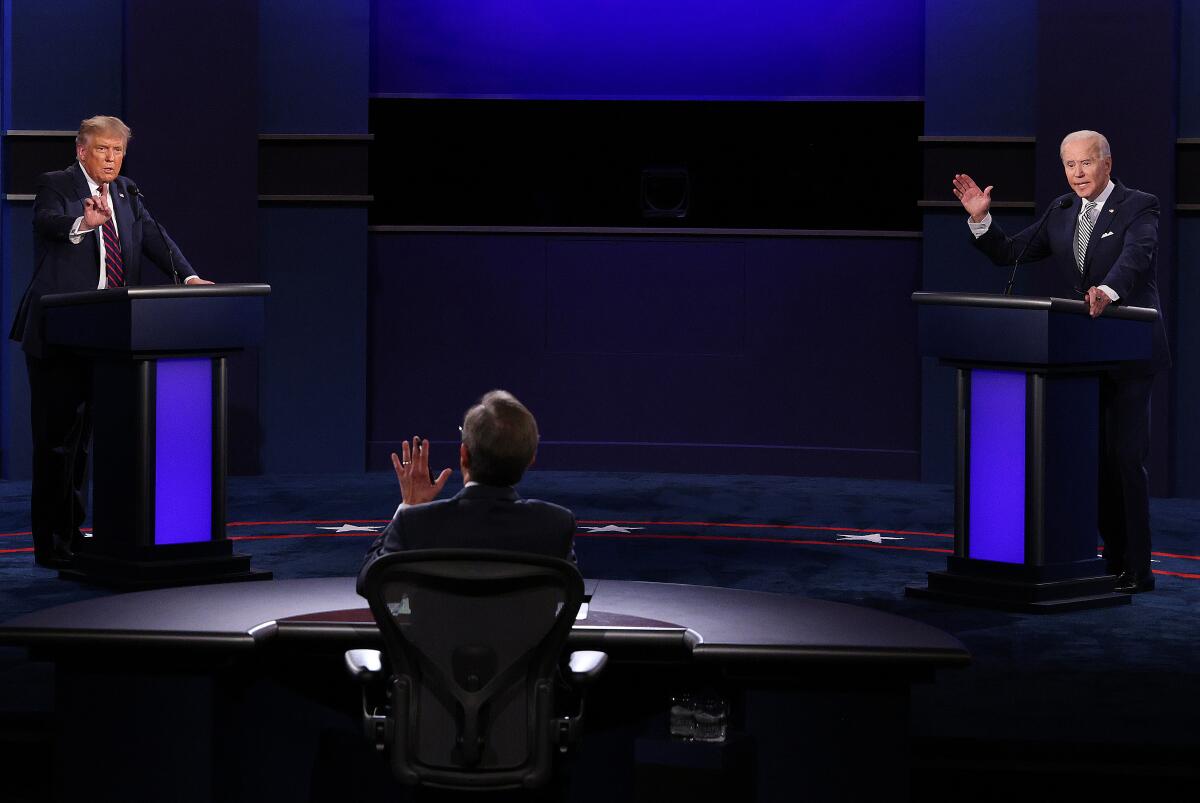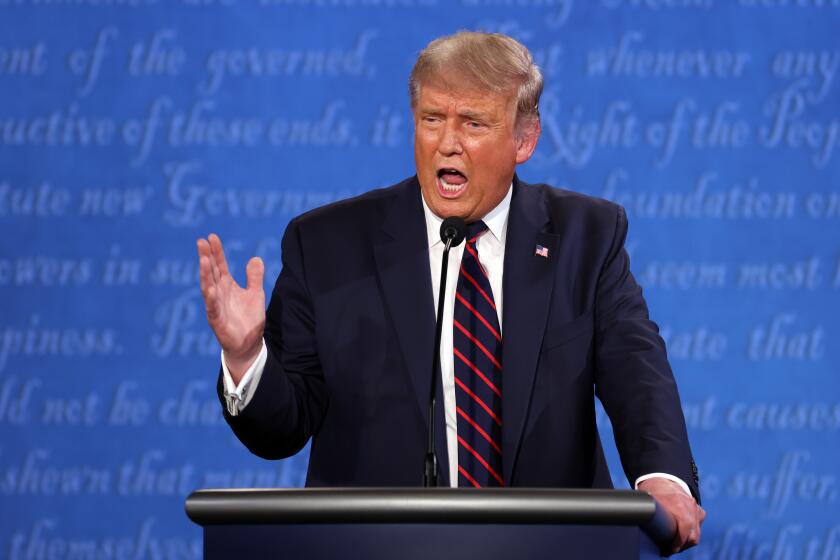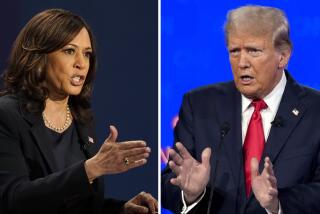We’re going to need a mute button to survive the presidential debates

- Share via
The whole country has one. Chris Wallace needed one Tuesday in Ohio. The public should insist that the next presidential debate moderator has one.
The mute button has become one of the most important elements of modern American life. It’s the little computer feature that controls whether your grunts, exhortations or scholarly observations are heard by others in the remote meetings that have become the way we meet, teach, preach and communicate in the age of COVID-19.
For the record:
9:42 a.m. Sept. 30, 2020An earlier version of this op-ed identified Ken Rice as a radio anchor; he is a television anchor.
And when social historians look back on these troubled months they will speak of masks, gloves and the phrase “Turn on your mute button.”
If only the negotiated debate rules had allowed Fox News anchor Wallace to have one when President Trump steamrolled into former Vice President Joe Biden’s speaking time Tuesday night. Or when Biden called Trump a “clown” and a “fool” and “the worst president America has ever had.’’
In the entire history of American presidential debates, there never has been a spectacle of imprecations and interruptions like Tuesday night’s prize fight in Cleveland. The only thing that came remotely close was Vice President Al Gore’s loud sighs of impatience and insult while Gov. George W. Bush was speaking in a debate in the year 2000.
Poor Chris Wallace, the moderator from Fox News. He was not only asking questions but trying to manage the president’s logorrhea.
Tuesday night was worse — so bad that Wallace felt the need to try to rein in the president, even to ask him why he wasn’t conforming to the debate rules that his own campaign had agreed upon. At one point, Biden said to the president, “Will you shut up, man?”
You don’t hear that every day in a debate for the most powerful job on Earth.
In earlier debates, the candidates did fight fiercely, though with fierce adherence to good manners. The 1960 matches between Richard M. Nixon and John F. Kennedy were emblems of civility compared to the Trump-Biden slugfest. A little boring, to be sure, which is why the principle thing we remember about the back and forth is that in the first debate one man (Nixon) perspired while the other (Kennedy) beamed with polish. But if you are interested in the long-ago dispute over Quemoy and Matsu — islands off the coast of China that were emblems of Cold War conflict — you would do well to listen in what transpired almost exactly 60 years ago this week. They actually talked about the issue, with one exchange — first Nixon, then Kennedy — going 4 minutes and 51 seconds without either man interrupting the other.
Not that Biden isn’t accustomed to interruptions. Marianne LaFrance, emerita professor of psychology and women’s studies at Yale, examined the vice presidential debate he had with GOP Rep. Paul Ryan of Wisconsin in 2012 and found that there was an interruption nearly every minute. But that was nothing compared to what he experienced in the chaos in Cleveland.
The mute button is, to be sure, a matter of dispute when it comes to debates. The KDKA television news anchor Ken Rice in Pittsburgh has moderated some feisty confrontations, including a Senate debate in Pennsylvania between then-Republican Sen. Rick Santorum and his challenger, Bob Casey, in 2006.
“I get the appeal of a mute button,” Rice told me. “But that would give a whole lot of control to whoever’s controlling that button — whether a technician or the moderator. Too much control, I think. Better to let the viewers see and hear it all. If there’s chaos, viewers may hate it. They may love it. But they should not be protected from it.”
And yet the interruptions Tuesday evening made the entire proceedings seem like political roller derby, or an episode of “Survivor.”
We didn’t learn one new thing about either man, their approaches to governing, their visions, their way of looking at the world. The only surprise: Trump had a face mask in his pocket Tuesday night.
The internet is full of advice about how to handle serial interruptions, though much of it is directed at child rearing. David Ezra Stein’s “Interrupting Chicken,” about a little red chicken afflicted with Trump and Biden syndrome, was a 2011 Caldecott Honor Book. The poet and essayist Stephen Kuusisto, now a professor at Syracuse University, wrote a book titled “Do Not Interrupt: A Playful Take on the Art of Conversation” in 2010.
But we don’t need an advice book or a children’s story to tell us that what we saw Tuesday night was bad manners. The question is whether, after that debacle, Americans will have the taste to interrupt their evening Oct. 15 when the great interrupters have their second debate.
David M. Shribman teaches U.S. politics at Montreal’s McGill University.
More to Read
A cure for the common opinion
Get thought-provoking perspectives with our weekly newsletter.
You may occasionally receive promotional content from the Los Angeles Times.










